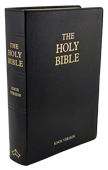The Holy Bible – Knox Translation
The Book of Proverbs
|
Chapter 18
|
1
None so quick to find pretexts,✻ as he that would break with a friend; he is in fault continually.
2
For prudent warnings a fool has no stomach; nothing will serve but to echo his own thought.
3
Little the godless man recks of it, when he falls into sin’s mire, but shame and reproach go with him.
4
Man’s utterance has currents like the waters that run deep; from wisdom’s well flows a stream in full flood.✻
5
Foul shame it is to court favour with the wrong-doer by turning justice aside from its course.
6
A fool’s talk is for ever embroiling him; let him but open his mouth, blows will follow.
7
From his own words his undoing comes, from his own lips the snare.
8
Innocent enough seem the words of the back-biter, yet their poison sinks deep into a man’s belly.
(Slow natures every fear disarms; womanish souls shall go hungry.✻ )
(Slow natures every fear disarms; womanish souls shall go hungry.✻ )
9
Dainty and listless go to work, thou art own brother to that work’s undoer.
10
No stronghold like the Lord’s name; there the just take refuge, high above reach.
11
What citadel has the rich man? His own possessions; he seems shut in by a wall impregnable;
12
yet hearts are proudest when ruin is nearest; humility is the ante-chamber of renown.
13
Let a man hear the tale out before he answer, or he is a fool manifest, marked out for shame.
14
All mortal ills the spirit of man can bear; if the spirit itself be impatient, there is no lightening his lot.
15
Prize of the discerning heart, quest of the wise man’s ear, is to learn truth.
16
The gift made, how it opens a man’s path for him, wins him access to the great!
17
An innocent man is the first to lay bare the truth; let his neighbour come and search him as he will.✻
18
The lot brings feuds to an end; greatness itself must bow to the lot’s decision.
19
When brother helps brother, theirs is the strength of a fortress; their cause is like a city gate barred, unassailable.✻
20
As mouth speaks, belly shall find its fare; a man’s own words bear the fruit that must needs content him.
21
Of life and death, tongue holds the keys; use it lovingly,✻ and it will requite thee.
22
A good wife found is treasure found; the Lord is filling thy cup with happiness. (A good wife cast away is treasure cast away; leave to fools, and godless fools, the adulterous embrace.✻ )
23
Poor men must cringe, for the rich to rate them.
24
A man endeared to thee by fellowship will prove a better friend to thee than thy own kin.✻


